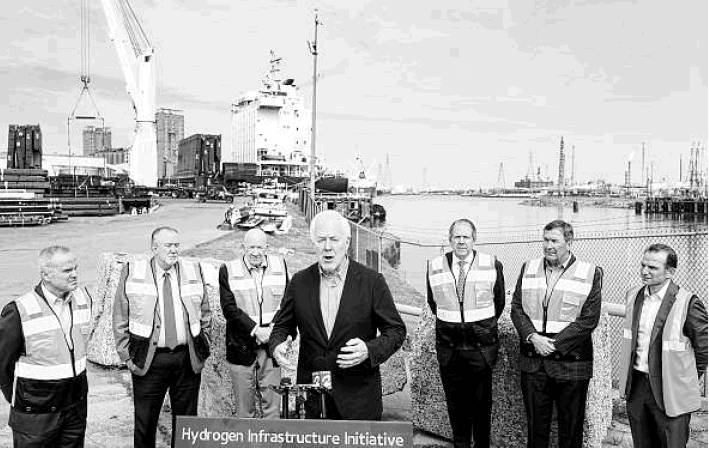Cornyn pitches hydrogen legislation
By Shelby Webb STAFF WRITER
Texas Sen. John Cornyn met with port officials and industry leaders Thursday to outline his vision for three bills he has introduced that would pay to help grow the hydrogen industry in Houston and the nation.
The Hydrogen Infrastructure Initiative, sponsored by Cornyn and Louisiana Republican Sen. Bill Cassidy along with three Democrats, would create grant programs to encourage building hydrogen infrastructure at ports and heavy industrial facilities. It also would launch a financing program to provide grants and loans to support hydrogen transport infrastructure, such as storage and vehicle refueling stations.
Cornyn, who spoke at the Manchester cargo terminal along the Houston Ship Channel, said hydrogen has taken on a new significance as a potential fuel source. He cited Toyota, which has held up hydrogen fuel cell technology as an example of how it could be used in day-to-day transportation.
“It indicates there may be greater opportunities to use hydrogen in places like port facilities, like this, and industrial applications that will require a build-out of infrastructure,” Cornyn said. “If you can provide that option in places like the Port of Houston, it’s a huge game changer.”
Cornyn’s plan would help build momentum toward increasing the use of hydrogen as a fuel for industries such as petrochemical production, oil refining and transportation.
Civic leaders have said Houston is an ideal testing ground for hydrogen thanks to the region’s existing oil and gas infrastructure that includes hundreds of miles of pipelines, chemical refineries and engineering talent.
Already, Houston is the largest producer of hydrogen in the country, churning out about one-third of the annual U.S. total. There are 48 hydrogen production plants here, along with more than 900 miles of pipelines specifically designed for hydrogen — about one-third of all hydrogen pipelines globally.
Jim Teague, co-CEO of midstream giant Enterprise Products Partners, said his company is well-versed in repurposing pipelines for various chemicals and gases. Already, he said, some of Enterprise’s facilities produce hydrogen as a byproduct when making other petrochemicals, but they have usually sold off the gas. Now the company is looking at how to keep and use the gas. Enterprise’s newest plant will recycle the hydrogen byproduct and use it instead of natural gas as a fuel source, preventing about 450,000 tons of carbon dioxide from entering the atmosphere, Teague said.
“If you’re going to do something, it has to make money too. We’re not going to do something for the fun of it — we’re going to need the type of legislation you’re using to get to where we need to go,” he said, referring to Cornyn.
Monty Heines, Dow Chemical’s director of Houston operations, said companies like his have made pledges to become carbon neutral in the coming decades — and that hydrogen could be a key tool to achieve those goals. But the use of hydrogen would have to be financially feasible to encourage companies to make the switch from natural gas, he said.
“How can we make hydrogen more competitive with other fuels like natural gas? If you can get the infrastructure in place, that really gives us a leg up to get there,” Heines said.
Teague said he was loath to call adopting more hydrogen technologies part of an energy transition, and Cornyn said adding hydrogen would become part of Texas’ “all-of-the-above” approach to energy. Hydrocarbons would remain an important part of the state’s energy ecosystem for decades to come, Cornyn said, but that federal financial incentives would be needed to diversify the energy produced in Texas and that nation.
Cornyn said he would pull his support for the measure if it were lumped in with the Biden Administration’s proposed Build Back Better Act. The comprehensive legislation is slated to cost $1.75 trillion and would include subsidies for energy technology but also measures to combat climate change, which Cornyn said would hurt Texas’ energy economy.
Instead, Cornyn said, he hoped to incorporate it in the tax code through the Senate’s finance committee. He likened it to the grants and tax credits that have been given to wind and solar projects. shelby.webb@chron.com
